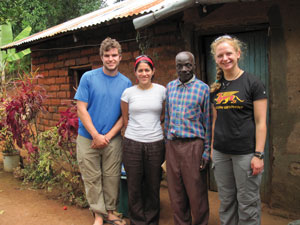
Building a Better Tomorrow
By Kerrie Waddington
Features New Technology ProductionVets Without Borders helps breed healthier chickens in Tanzania
In Tanzania, some of the world’s most breathtaking sights intersect.
Mount Kilimanjaro, the highest peak in Africa, looms over Tanzania’s
plains with its snowy caps glistening under a veil of cloud. Along the
stretching Serengeti, zebras, gazelles and wildebeests kick up plumes
of dust in the world’s largest migration. In the Zanzibar Archipelago,
the labyrinth-like streets are lined with colourful fruit stands and
the air is heavy with the scent of cloves and nutmeg.
In Tanzania, some of the world’s most breathtaking sights intersect. Mount Kilimanjaro, the highest peak in Africa, looms over Tanzania’s plains with its snowy caps glistening under a veil of cloud. Along the stretching Serengeti, zebras, gazelles and wildebeests kick up plumes of dust in the world’s largest migration. In the Zanzibar Archipelago, the labyrinth-like streets are lined with colourful fruit stands and the air is heavy with the scent of cloves and nutmeg.
 |
|
| A Better tomorrow Vets Without Borders (VWB) sent students (L to R) Kyle Steeves, Jessica Gonzalez and Shannon Westgarth (pictured with the head of Ilima village) to participate in VWB’s poultry program in Tanzania. Advertisement
|
Yet, in the midst of such astonishing beauty, life in Tanzania is often filled with staggering hardship. Tanzania is one of the world’s poorest countries, and it has been devastated by HIV and AIDS. Although many families, especially in southwestern Tanzania, rely on subsistence farming, food yields are unpredictable due to poor soil. Often, local crops like maize, beans, cassava and yams only produce a six-month supply of food each year. Also, since few families can afford cattle or goats, many households manage chickens – though the local breed of chicken only produces about 40 eggs per year.
A Canadian non-profit organization called Veterinarians without Borders/ Vétérinaires sans Frontières (VWB/VSF) is collaborating with Tanzanian communities to develop a poultry program in hopes of building a better tomorrow.
To turn these hopes into a reality, in 2006 VWB/VSF member Dr. Roger Thomson initiated the poultry program in Rungwe, a district of southwestern Tanzania, to help improve chicken health and productivity, and to train local farmers in poultry management. Working with local partners, like Dr. Uswege Minga of the Open University of Tanzania, Dr. Thomson introduced a program whereby local chickens are cross-bred with Rhode Island Red cocks to create larger, healthier and more productive chickens.
Drs. Thomson and Minga also initiated a farmer education and support program. Through this initiative, local farmers and agriculture officers have “kitchen meetings”, or casual information sessions, and periodically visit the Uyole agricultural college for training.
“There has been a steep learning curve on this project,” says Dr. Thomson. “From understanding the local issues and the best way to manage the flow of funding, to deciding which groups to engage and where to concentrate efforts.”
Three years later, the project is still going strong and it has recently taken an exciting twist. In Ilima and Lubanda, communities in Rungwe, approximately 35 per cent of high school students have been orphaned by HIV and AIDS. For these students, access to food and money is scarce, and prospects for the future are limited. In response to these challenges, VWB/VSF is working with the students to expand the poultry program to the local high school.
In this phase of the poultry program, VWB/VSF will collaborate with local partners to build a multi-purpose facility where a few students will live and manage a coop of donated chickens with ongoing support and training from local livestock officers and VWB/VSF. Egg sales will subsidize their school and living expenses, while the experience will help them develop skills to improve their livelihoods. This poultry program will also serve as a “model farm” in the community where local farmers can meet, discuss, and learn about successful poultry production.
This past summer, VWB/VSF helped send three Ontario Veterinary College students – Kyle Steeves, Jessica Gonzalez and Shannon Westgarth – to Rungwe to work with Dr. Thomson.
“Our experience in the village has been a very positive one and it seems like most of the people are eager to learn more about poultry husbandry,” says Gonzalez. “More access to resources and knowledge would greatly benefit Tanzanian farmers in the future.”
The VWB/VSF team met with local farmers, conducted surveys to determine the success of the project so far, vaccinated chickens for Newcastle Disease and worked to reduce the high chick mortality rate. The team also gave workshops at the high school to introduce poultry management to local students.
“The students all seemed to learn a lot,” says Westgarth. “They were very enthusiastic about the material.”
VWB/VSF’s initiatives are carefully designed so that communities can take ownership of the project and move confidently towards leading the project. Through this poultry project, students are armed with valuable skills and training so they can pass their knowledge on to others in the community. This focus on sustainability ensures that the project’s impact will ripple through the villages of Ilima and Lubanda, throughout the region of Rungwe, and hopefully beyond.
“We’re hoping that this chicken coop will be a lasting part of our work,” says Steeves. “It can be used by the school for years to come to provide future generations of farmers in the Ilima area with the knowledge they need to be successful.”
This holiday season, Canadians can directly support this student poultry project without even leaving their homes. VWB/VSF’s One World Gifts campaign gives Canadians the opportunity to reach out to vulnerable communities. Canadians can choose from six meaningful projects – including “Healthy Chickens, Healthy Tanzanian Students” – and show their support by sending e-gifts to friends, family and co-workers. One World Gifts can be purchased at www.vwb-vsf.ca .
Print this page